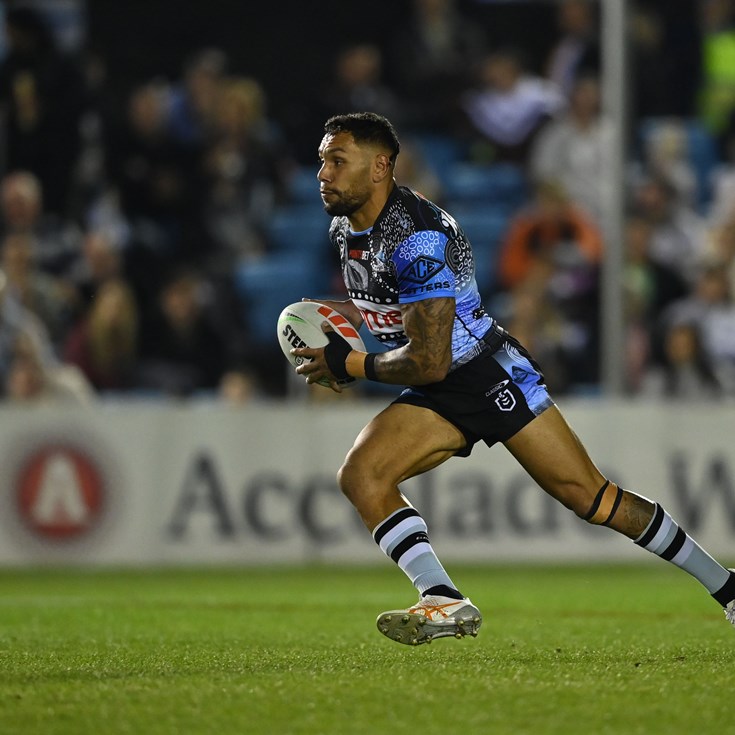
As a white woman, I will never understand the experience of being an Indigenous Australian.
However, what I can do is listen and learn from the Indigenous people in the rugby league community and commit to a future where we continue to listen and learn from each other.
In 2002, my family went on holidays to the Northern Territory. It was a wacky family adventure and as a teenager I was lucky enough to visit many places including Kakadu National Park and Kings Canyon. Of course, the highlight was Uluru.
I first saw the giant monolith as the sun was rising, with colours exploding in the sky behind it. It was the biggest thing I had ever seen.
Later that day as we explored Uluru and its surroundings, I watched as many people took the chance to climb it. At that point I did not understand the cultural significance of the sacred site and the disrespect that climbing Uluru demonstrated to the traditional owners of the land, the Anangu people.
I suspect, at that point in time I was not alone in my ignorance.
Laid bare: Renouf, racism and rugby league
There was very little scope to learn back then about Indigenous history in school and from a sporting perspective, there was no NRL Indigenous Round and Preston Campbell’s first All Stars game was eight years away.
As a country we are still walking the path towards reconciliation, but fortunately plenty has changed since 2002.
Since the introduction of the NRL’s Indigenous Round it has become far more than a celebration of the contribution Indigenous people make to our game.
It simply highlights what so many of us know to be true – the Indigenous community is part of the fabric of our game and that whilst Indigenous Round highlights this, we are seeing conversations about the importance of inclusivity happening throughout the year.
But it’s about far more than "shake-a-leg" and "goanna" post-try celebrations. Our players want to encourage a conversation and encourage us to listen to a different perspective.
Cody Walker and Latrell Mitchell have been courageous enough to share their views about singing the national anthem before certain games.
They not only shared these views with fans, but also had the chance to speak with the NRL’s Indigenous Council and the ARL Commission. For the most part, these views were respected and then listened to.
Professor Megan Davis has shared much with us too (apart from her passion for all things rugby league).
Davis played a key role in the development of the "Uluru Statement From the Heart" focused on enshrining a First Nations voice in the Constitution through substantive constitutional change and reform. The NRL pledged its support to this statement last year.
NRL Uluru Statement from the Heart
Without rugby league, I may not have had the same exposure to these issues.
Culture also means fans can get to know our players better and really understand what makes them the people they are.
I only recently found out that Connor Watson is a proud Indigenous man. Watson is a Gamilaroi man and after the tragic death of his cousin Parker to suicide in 2017 his family decided to do something about it.
For Indigenous kids aged between five and 17, suicide is the leading cause of death.
Watson’s ‘Boots for Brighter Futures’ charity an outlet for Indigenous youth
It is a sobering statistic and one that Watson and his family are committed to change through their "Boots for Brighter Futures" initiative, which focuses on assisting in the prevention of Aboriginal and Torres Strait Islander youth suicide.
The initiative started with Watson wearing a pair of boots with a design painted by his father.
This prompted a conversation with his non-Indigenous teammate Aiden Guerra who also wanted to play his part. Two years later, the initiative is spreading through the NRL, with children designing boots for players from many clubs including the Wests Tigers, Gold Coast Titans and New Zealand Warriors.
How Indigenous identity discovery transformed Badger’s life
Our Indigenous community is woven through the fabric of rugby league through our players like Blake Ferguson, Jesse Ramien and Latrell Mitchell, to referees like Gavin Badger, to the media including Yvonne Sampson, Gorden Tallis, NRL.com's very own Tanisha Stanton, Jamie Soward and Steve Renouf, to our leaders like Katrina Fanning and Megan Davis.
It is also woven through our history.
I love the way that players like Arthur Beetson, Greg Inglis and Johnathan Thurston continue to be celebrated and the way those players were revered by our current players like Joel Thompson, Jack Wighton and Ryan James when they were growing up.
The next generation coming through has a whole new group of players to aspire to be like on and off the field, but the most exciting part is that young Indigenous women now have role models of their own like Tallisha Harden, Quincy Dodd and Shakiah Tungai.
Indigenous Round may be one week a year, but there are another 51 weeks in the year where we have the opportunity to listen and learn from our Indigenous players and make sure that our game not only continues to encourage inclusivity, but to celebrate it as well.

